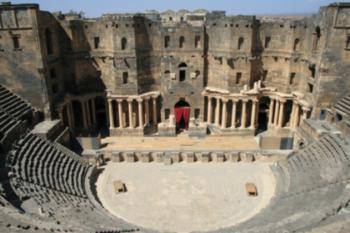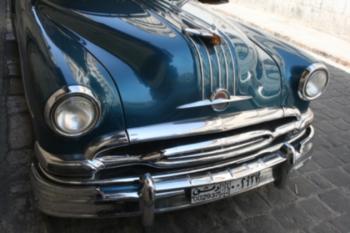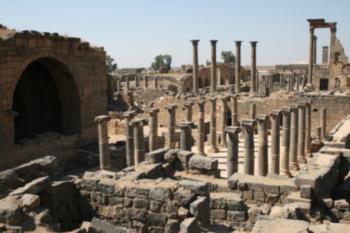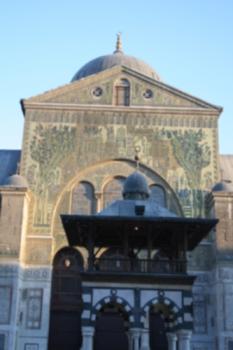
“Are you sure you want to go to that bus station?” the surprised sounding taxi driver asked. “Where do you want to travel to?”
Polyglot taxi drivers around the world never fail to surprise. Even in places that barely make it onto the tourist radar, the chances of finding a taxi driver with at least 100 words in English are quite high. This one was no different and he came with the added bonus of accepting to use the meter.
“Down south from here, Bosra.” I said confidently in my less than perfect Arabic.
“Bosra?…So why do you want to go to that station?”
Up until the day before this conversation that was being held above the melodic blend of the taxi’s blaring stereo and the cacophony that comes off the streets in the centre of Damascus, I had been conducting an experiment in traveling as in the days of old, flying without a net, going it alone without a guidebook. Keeping open to suggestions from people on the street and dependent on the information that they suggested, I had been experiencing Syrian neighbourhoods that weren’t on the guidebook maps. Trusting the locals to know best, I had been leaving my itinerary completely open to what they thought most appealing about the places that they live.
Until of course the day before. I had been staying with a friend in Damascus and I broke down. Not wanting to disturb my hosts with pesky tourist questions that they had been asked a hundred times, I had nonchalantly taken a guidebook off the shelf, looked up my destination, wrote down the bus station mentioned and flagged a taxi out on the hot summer streets of what is often touted as the world’s oldest continually inhabited city. Melting into the plastic seat of the red taxi I was already regretting my guidebookaholic slip as the questioning continued.

“Well, that’s the station for buses to Bosra, isn’t it?”
“It was…”, luckily my Arabic lessons had included the past tense.
I tried to regain the trust that had been the key to the journey so far, but maybe the fact that 7 taxi drivers had flat out turned down my polite request in archaic Arabic for them to use the meter before this one made my face read a bit skeptical.
“I’ll show you,” was his response to the pained look on my face.
Quickstepping through the middle-eastern traffic ballet, we arrived unscathed to the square I had asked for and he definitely wasn’t lying. You could see that there had been a bus station there once upon a time, but now the only thing left was years of oil stains on an empty concrete pad.
“Well, where to now? Where is the Bosra bus station?”
“In the south of the city, in the new station, but I’m not 100% sure,” he answered as he once again began the dance through the Damascene streets, though this time with his head out the window asking other taxi drivers if indeed the Bosra bus left from the new station.
Classic accounts of Damascus tell of a city surrounded by orchards of fruit trees, but these have long been eaten up by an urban sprawl that climbs up ancient Mt. Kassioun and extends in all directions below it. Cain wouldn’t know his old stomping grounds nowadays and we seemed to be driving through its entirety.
Watching the mountain where Adam supposedly mourned Abel fade in the rear view mirror and with the taxi’s meter climbing, I had begun to seriously think that I was being taken for more than a ride to the bus station and was just about to say something when we pulled up to a newish looking station…just in time to miss the last seat on the bus, the next one was in 2 hours.
I wondered if I would have found a seat had I simply asked the driver for the Bosra station in the first place and if my mistrust hadn’t earned me a 2 hour wait for the next bus. Traveler’s trust was the issue here and I wondered where mine had gone.

The 140 odd kms from Damascus to Bosra takes you south to where the desert really begins, running from here all the way to Saudi Arabia, Iraq and beyond. Turning left just before Jordan among the few olive tree plantations struggling in the baked earth, the area becomes slightly greener. It may have been lush back when the Nabataens founded the city, but today’s lack of water is telling in the sparse and drooping olive groves. Buildings of black basalt stone start to appear amongst the typical cinder block shops that line the roads of the Middle East. An enormous black gate built by the same architects that gave us Petra announces the entrance to the city. Striking as it is, your eye is quickly diverted to the main goal of most tourists, not to mention once-upon-a-time Crusaders, who care to stop by…the Roman theater turned Arabic fortress that could be seen just beyond.
On their road to the Red Sea in the second century A.D, the Romans decided they needed some roadside entertainment and built a huge free-standing amphitheater, said to be the largest of its kind in the world. This in itself would have been striking enough, but around the 11th century when the Crusaders were paying visits to the area, the Ayyubids fortified the amphitheater with massive black walls and towers. Thankfully these days it is once again being used for its original intentions, complete with a poster announcing that Julio Iglesias was coming to town soon.
Just outside the amphitheater-cum-fortress-cum-Julio stage lie the remains of the Roman city. What makes this place different from other similar sights scattered around the Mediterranean is the stone used. Broken matchsticks of black columns rise from the equally black ruins. Byzantine-era buildings huddle on the Roman grid contrasting with the light coloured earth looking like a chessboard.

Here amongst the ruins I realized why the buildings leading in to the town had been peppered with black. In Syria its not uncommon to see the stone walls erected by shepherds to keep in their flock to be adorned with Byzantine motifs and Bosra was no different. The locals have been recycling the old stones for centuries. Families had made their homes in the ruins and children skirted around the tourists in their football match against the ruins of a 4th century Byzantine church.
While I waited for the bus back to Damascus another polyglot told me over tea of a more recent though old enough tale of Bosra. The city has always been an important stopover for caravans traveling between Damascus and Mecca and it was here legend has it that Mohammed met his first Christian, a benevolent Nestorian monk named Buhaira. This monk invited Mohammed’s uncle’s entire caravan in for a meal and trusting the man, they gladly accepted. Over the meal he foretold young Mohammed’s prophethood and through this meeting probably instilled the seed of the Prophet’s positive outlook towards Christians. Mistrusting the monk could have greatly altered the future.
Back in Damascus sitting on a terrace enjoying Lebanese beer in the jasmine scented cooling evening I could hear the Islamic call to prayer and the ringing of the bells of at least 3 different denominations of churches. Traveler’s trust so many years ago laid the groundwork for the unique co-existence and tolerance found today in modern Syria. It shows that a lot can be learned from simply flagging down a taxi for a ride to Bosra.